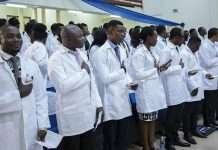
The World Health Organization says Nigeria is still far from meeting the 2001, 15 per cent Abuja Declaration on health sector improvement.
WHO’s Country Representative to Nigeria, Dr. Walter Mulombo, said this in Abuja, during a with journalists.
He noted that in April 2001, heads of state of African Union countries met and pledged to set a target of allocating at least 15 per cent of their annual budget to improve the health sector
“In Nigeria, a proposed target was set that 15 per cent of the total government budget should go to health. Until today, we are still far from achieving the target,’’ he said.
Dr. Mulombo advocated for more funding of the health sector to meet the said target, noting that the sector was not adequately funded, when compared to others such as defence, army, among others.
According to him, health is a human right and not a luxury or consumable, adding that the more politically wise decisions taken by the country will be of benefit.
“We need to start talking about human rights violations because it is not acceptable for any child to miss a vaccine,’’ he said.
Dr. Mulombo noted that the main challenge lies in the way health is featured as a political choice, adding that unfortunately, many governments did not live by the standard.
“Many countries continue to consider health as a luxury or something that is costing the government money, whereas it should have been taken as an enabling factor for economic and socio-economic development,’’ he added.
He said it was worrisome the way countries are dealing with social determinants of health, like socioeconomic status, education, neighborhood and physical environment, employment, social support networks, and access to health care.
According to him, addressing social determinants of health is important for improving health and reducing longstanding disparities in health and healthcare.
Dr. Mulombo advocated for more facilities with dialysis machines and more expensive equipment to combat noncommunicable diseases, noting that such was part of the organisation’s challenges.
He said that the WHO, also had the challenges of demographic transition because facilities that were used during the colonial period are still the same in Africa, noting it might be possible that Nigeria is facing the same situation.
“The country is not expending in the space of demographic transition and the way the population is increasing. Nigeria is projected to have more than 400 million population by 2040, 2050,’’ he added.
Dr. Mulombo said that there was also the problem of how the county prepares for response to outbreaks of pandemics.
He said the COVID-19 pandemic was not expected and as such, caused havoc in many counties.
“The health body is still expecting flu pandemic and has been preparing for it.
“When the COVID-19 pandemic hit the world, no country was ready, not even the United States and UK, yet we have International Health Regulations and Global Health Security Agenda,’’ he said.
(NAN)













